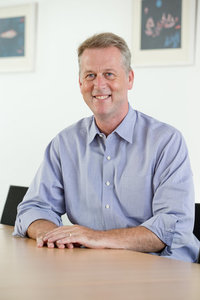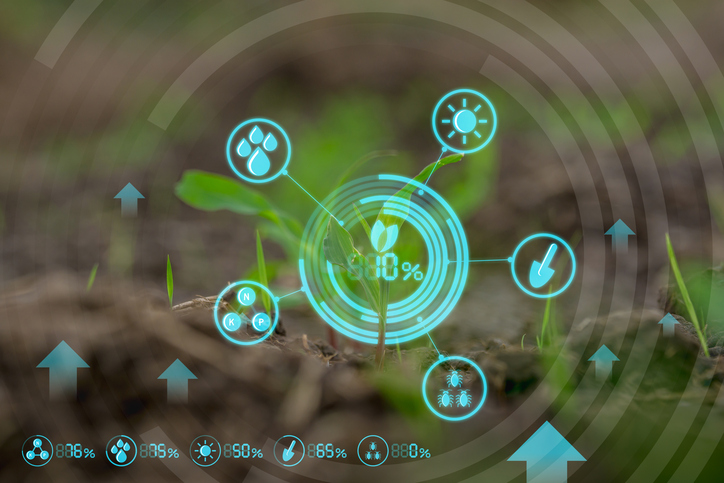April 4, 2019
By Michelle Pelletier Marshall, GAI Media
Finistere Ventures, one of the pioneering venture capital firms in the agtech space, just welcomed Adrian Percy as its chief technology officer. With an agricultural career that spans 25 years, Percy had most recently been head of R&D for the Crop Science Division of Bayer. At the frontline of leading open innovation and game-changing, collaborative research in ag at Bayer, it was a natural fit for Percy to make the switch to this global technology and life sciences investment firm – based in San Diego – with a focus on transforming the food value chain.
In his new role, Percy will provide strategic, technical, and regulatory support to Finistere’s broad portfolio of agtech and foodtech companies, and help identify new investment opportunities. Percy also will sit on the boards of two of Finistere’s portfolio companies: Hi-Fidelity Genetics and BioLumic.
 Percy has worked closely with Finistere on projects in the past, and it was their philosophy on the importance of collaboration – be it with growers, other investors and entrepreneurs, major corporate entities, or even governments – that persuaded him that now was the time to join the Finistere team. “I was also very attracted to Finistere’s global footprint and the ability to identify new opportunities across many different geographies,” Percy said in an interview with Arama Kukutai, cofounder and partner at Finistere Ventures.
Percy has worked closely with Finistere on projects in the past, and it was their philosophy on the importance of collaboration – be it with growers, other investors and entrepreneurs, major corporate entities, or even governments – that persuaded him that now was the time to join the Finistere team. “I was also very attracted to Finistere’s global footprint and the ability to identify new opportunities across many different geographies,” Percy said in an interview with Arama Kukutai, cofounder and partner at Finistere Ventures.
GAI News caught up with Percy as he set up his office at Finistere’s new location in the Research Triangle area of North Carolina, where he will act as a focal point for the company’s activities on the East Coast as well as be a strategic bridge to its activities in Europe and beyond.
1. From your experience at Bayer you got to see firsthand the incredible surge in agtech. In your new role, how do you see yourself contributing to this rising ag and foodtech ecosystem?
The opportunity to combine my background with a market-leading agribusiness company and one of the most experienced ag and foodtech venture firms really felt like something that I could not pass up. I intend to put my experience to good use helping Finistere’s current and future portfolio companies develop their business, technology and regulatory strategies. I will also be working with the rest of the team to develop and evaluate new ideas and technologies as they emerge. However, beyond that, I really would like to play a role in helping to develop the overall ecosystem. I love to connect people and ideas and am a firm believer that collaboration generally drives better outcomes for all.
2. You have called your leap into the world of venture finance scary “but also exhilarating”. What are you most excited about delving into as CTO?
I am thrilled to be moving into this new role for many reasons. In my opinion, this is a “golden age” for agricultural technology, and I want to be working at the cutting edge of the innovations that will propel us forward. It has become increasingly clear that some of the more disruptive technologies will emerge outside of the walls of the agribusiness giants due to the surge in capital and technology tailwinds. In turn, the big players are embracing an “open innovation” concept and are happy to see these technologies being de-risked externally in a way that the pharmaceutical industry has done for a while. That trend, combined with new market entrants and business models within the sector, makes for lots of different exit opportunities. The venture space is a very dynamic and exciting space to be in ag!
3. You have talked about the stresses on the agricultural system — a growing population, declining per capita farmland, evolving pest pressures, shifting consumer preferences, increasing regulatory restrictions, and a changing climate – requiring a radical reinvention in the way we approach ag research. How will you lead the way with this at Finistere?
I believe that the scale of the challenges that you have described are still being woefully underestimated by many. A great example of this is the decrease in public funding for agricultural research that we are seeing in many countries around the globe, which simply does not make sense to me. I have always said that these challenges can not be solved by one entity or company. It will take a coalition of many, including growers, academia, industry, and governments, to drive meaningful change. One of the characteristics of Finistere’s business model that I really appreciate is the team’s passion for creating alliances with all of those different groups in order to drive progress. In fact, Finistere has a proven track record for investing in technologies developed via public funding that demonstrate commercial promise. I think our shared passion for collaboration will help drive the next phase of ag research, innovation, and commercialization.
4. The development of agtech hubs and foodtech innovation throughout the world, such as in Israel or Ireland, is a focus for you and Finistere. In what region do you see the most growth potential?
Tough question! Agriculture is an incredibly diverse industry with a multitude of different production systems, geographies, and climates. Farmers consequently face many different types of challenges. Therefore, it makes total sense that solutions to these challenges often emerge locally before they eventually transfer to other regions and production systems. Israel is a well-known example of a country with tremendous agricultural challenges, which coupled with its great science roots, entrepreneurial spirit, and government backing has driven its emergence as a significant agtech hub. Ireland has also become a hotbed for tech innovation, and the agtech community there is booming. However, there are other pockets of activity and innovation that are on the rise around the world including in different parts of Europe, Australia and New Zealand, and Latin America. Finistere is devoted to engaging with entrepreneurs in all of these markets as we continue our push to build a strong local presence in high-potential geographies. We want to help drive global innovation hubs and ensure our portfolio companies have full access to all of the top ag economies.
5. Since Finistere began investing in agtech in 2005, investor interest in the sector has grown exponentially with $2.2 billion dollars in investment in the space last year where there was not even a quarter of that four years ago. How do you explain this explosion in the agtech space, and do you see it continuing at this pace?
I can very clearly recall the surge in global food prices in 2008, which really spoke to the fragility of our food system and perhaps created the initial public awareness that we needed a fundamental transformation in the sector. Those events, in combination with the incredible projections of population growth, drove the realization that opportunities existed for companies bringing new innovation to the market. While those challenges are still far from being fully solved, new consumer and environmental trends are supplementing, and sometimes even opposing, all of the progress being made in an attempt to achieve such solutions. So, yes, I think the agtech innovation explosion will continue. I also hope we continue to see increased investment and returns as the sector matures.
6. You are a strong proponent of the development and adoption of new agricultural and food technologies that support global food security while conserving the environment. To what end will this define your R&D, technology, and commercialization efforts with Finistere?
This will certainly be an important focus area. We are very interested in technologies that can increase environmental sustainability and preserve resources, such as those increasing water use efficiency or reducing the environmental impact of synthetic fertilizers. We, nonetheless, also recognize that productivity needs to be addressed, and our sweet spot is technologies that can address both areas.
7. Many substantial investments and a high rate of consolidation has occurred in the agtech space, such as Merck’s December 2018 acquisition of a digital livestock tech company for US$2.37 billion. Do you see this trend continuing and why?
We have seen a high rate of consolidation across the industry for a couple of reasons. One of those is clearly the desire to integrate across technology platforms and, in particular, to provide a product range that is supported by a digital capability. This is no different than other industries, although agriculture has lagged behind many. I expect this trend to continue until all the major players have integrated digital capabilities and some strong independent platforms rise the ranks. The big question, in my mind, is still how, and at what speed, growers and ranchers will adopt and use these tools.
8. Finistere funds investments from Seed to Series A or Series B – what sort of investments are on the radar at this time?
Finistere has a broad investment thesis that extends across the entire ag and food chain. You only need to look at its current portfolio to see that Finistere plays in everything from up-stream technologies, such as ZeaKal, through to consumer-facing offerings, such as Farmer’s Fridge. Moving forward, Finistere will continue to invest across companies supporting the entire food chain, covering areas as diverse as crop inputs, sensors, fintech, and new production systems, like indoor agriculture.
# # #
-Michelle Pelletier Marshall is managing editor for Global AgInvesting’s quarterly GAI Gazette magazine and a regular contributor to GAI News. She can be reached at mmarshall@globalaginvesting.com.

Let GAI News inform your engagement in the agriculture sector.
GAI News provides crucial and timely news and insight to help you stay ahead of critical agricultural trends through free delivery of two weekly newsletters, Ag Investing Weekly and AgTech Intel.




